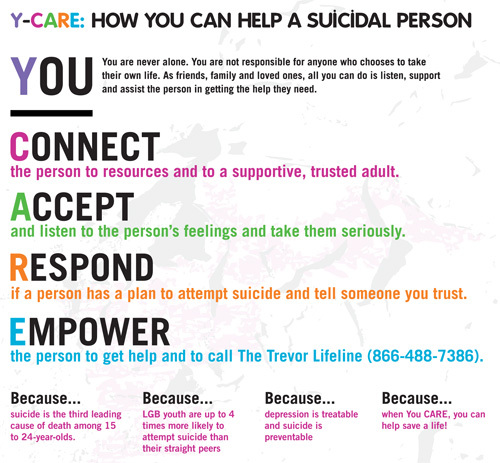The fall is a time of many changes, especially for young people as they return to school or begin a new job. These changes can kick up many feelings including excitement, hope and anticipation, but for some young people, they can also bring up feelings of depression, anxiety, fear and dread. Even something as simple as watching those "back to school" TV commercials can be terrifying.
Sometimes, those difficult feelings become so overwhelming, they lead a young person to think about ending their life. It is important to listen to and respond when the young people around you are showing signs that might lead to suicidal thoughts or actions, and to know that you have the power to help. Since this week marks National Suicide Prevention Week, it's a good time to learn what to look for and how to help.
Why Should You CARE?
Because suicide is the third leading cause of death in young people ages 15 to 24 and it is the second leading cause of death among college students, it is vitally important for everyone to learn about suicide in relation to our youth.
Going a step further, if a young person is lesbian, gay or bisexual, they are four times more likely to attempt suicide than their straight peers, and the risk increases if those youth were highly rejected by their families - thrown out of the house, disowned, or worse. (While we can assume that similar rates exist for transgender youth, the data doesn't yet exist.) Just being LGBT does not automatically make a young person more likely to attempt suicide, but because they experience ongoing homophobia, transphobia, discrimination, bullying and negative messages, their overall risk for an attempt is heightened.
What Should You Look for?
Often people considering suicide suffer from depression. They might isolate themselves from friends or family, drastically change their eating habits, be tired often and disinterested in activities that they generally liked to do. They tend to have a negative attitude, especially toward themselves and feel hopeless to change. When someone is suicidal, they are usually experiencing severe, intense emotional pain, feeling trapped in their situation and in their life and feeling that they have no choices or ways to make things better. Unfortunately, they see suicide as the only escape from the pain that they're feeling and the experiences that they're going through. They may express thoughts of wanting to die, describe a specific plan for suicide and give away meaningful possessions.
Y-CARE for Life
It can be scary hearing someone you care about talk about ending their life. You may feel that you don't know what to do or how to help the person, but it is important to know that there are things you can do. The first step begins with You.
Even if a young person tells you not to tell anyone that they are thinking about suicide, it is very important not to keep this information a secret as doing so could mean the end of their life. Connect the person to mental health resources and to other supportive, trusted adults who can help keep them safe and get them the help they need. Accept and listen to the person's feelings and take them seriously. By paying attention and feeling concerned, you can help them to feel less alone, feel understood and may help reduce the intensity of their emotions.
If a young person tells you that they're thinking about killing themselves and have a plan to do it, immediately respond by telling another trusted adult such as a parent, relative, teacher, doctor or counselor. Since people who are suicidal often feel powerless and helpless, it can be tremendously helpful to empower them to get help, including talking with a counselor or therapist and calling The Trevor Lifeline at 1-866-488-7386.
Always remember that when You CARE, you can save a life.
